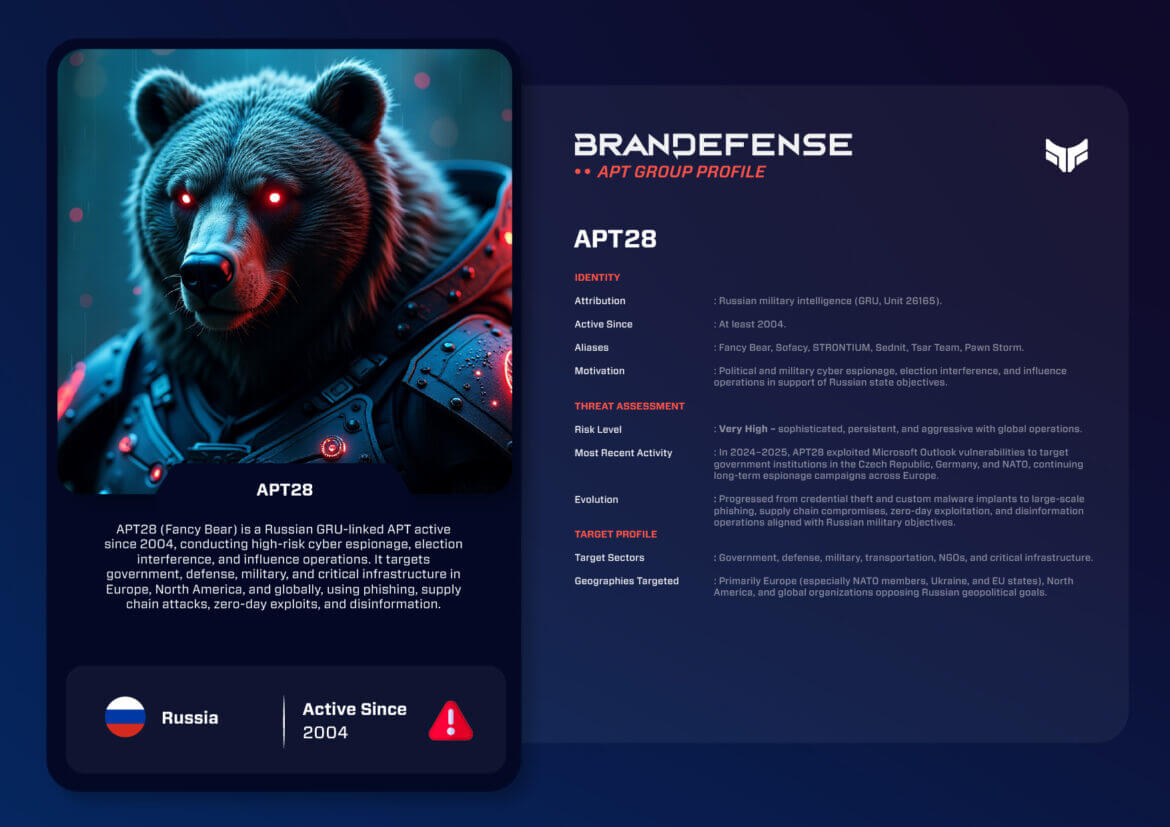
Introduction
APT28, also known as Fancy Bear, Sofacy, Sednit, STRONTIUM, and various other epithets, is the most recognizable and longstanding advanced persistent threat (APT) group still in existence. APT28 is the tip of the spear of Russian state-affiliated cyber capabilities. APT28 has been traced back as far as 2004, and the group has been assessed with high confidence by national intelligence organizations to be affiliated with the Russian military intelligence service (GRU, Unit 26165). For twenty years, APT28 has been involved in a leading role in cyber-espionage, political interference, and hybrid warfare as part of global issues. The group has consistently targeted NATO, the European Union, the United States, and international organizations aligned to counter Russian interests, with direct effects aligned in concert with Moscow at a geopolitical level.
This blog will explore APT28’s identity, applied tactics, tools, operational behavior, and the group’s progression relevant to 2025, along with both the strategic implications, and lessons for defenders.
Identity and Motivation
APT28 is believed to be part of the Russian General Staff Main Intelligence Directorate (GRU), specifically Unit 26165. Its long history of operations shows a consistent and clear alignment with Russian state interests, which includes intelligence collection, political influence, and undermining opponents’ institutions.
APT28’s motivations include espionage and influencing political outcomes and destabilizing adversaries, through the use of both disinformation and information warfare. APT28’s known roles in election interference campaigns highlight its value to the Kremlin not only as an espionage asset, but also in achieving Russia’s strategic objectives for influence.
Aliases: Fancy Bear, Sofacy, STRONTIUM, Sednit, Tsar Team, Pawn Storm.
Active Since: At least 2004.
Motivation: Its motives include political and military espionage as well as election interference and influence operations that directly support Russian state policy.
TTPs (Tactics, Techniques & Procedures)
APT28 has shown extensive adaptability,, utilizing both advanced zero-day exploits as well as extended periods of low-level access. Its tradecraft is characterized by flexible and scaleable operations, that could be utilized against a wide array of targets.
Initial Access
– Spear-phishing with attachments or links to malicious content.
– Exploitation of zero day vulnerabilities for widely used software platforms (MS Outlook, MS Office and Windows-like components).
– Credential theft and brute-force attacks.
Persistence
– The use of custom implants like Sednit and Zebrocy.
– The use of scheduled tasks and registry changes.
– Compromised credentials allowing long-lasting access.
Command and Control (C2)
– Custom malware families which have encrypted C2 communications.
– Compromised servers and dynamic DNS infrastructure.
– Covert communications channels embedded in trusted services.
Malware and Tools
– X-Agent: Modular implant designed for Windows, Linux, and iOS.
– Sednit/Sofacy loader.
– Zebrocy Trojan for credential harvesting and reconnaissance.
– Backdoors such as Chopstick and GameFish.
– Exploitation frameworks that have been positioned against Outlook vulnerabilities.
Techniques
– Credential harvesting and password spraying.
– Lateral movement throughout enterprise networks.
– Supply chain compromises to gain access to trusted ecosystems.
– Data exfiltration at scale.
– Coordinated disinformation and hack-and-leak operations.
Target Profile
APT28’s targeting mirrors the Russian geopolitical agenda and military interests.
- Sectors: Government, defense, military, transportation, non-governmental organizations, media, sectors designated as critical infrastructure.
- Geographies: Primarily NATO countries, Ukraine, members of the EU, North America, and entities associated towards outcomes that counter Russian interests.
APT28’s breadth in targeting showcases this as a multi-mission intelligence service rather than a single-purpose cyber espionage agent.
Notable Operations
APT28 has been associated with some of the most significant cyber events in the last decade, all of which have coincided with key geopolitical operations by Russia.
2016: Interference in the U.S. Presidential Election
APT28 infiltrated political party networks, exfiltrated emails, and facilitated the release of the emails to interfere in the outcome of the U.S. presidential election.
2017: Targeting of European Eelections
APT28 attempted to penetrate French election campaigns and German political organizations to influence political outcomes and undermine faith in democratic institutions.
2018: Doping Investigation Espionage
APT28 targeted organizations investigating the Russian state-sponsored doping issue and exfiltrated sensitive data to diminish the credibility of international organizations that conduct oversight.
2020: COVID-19 Vaccine Espionage
APT28 conducted spear-phishing and intrusion operations against vaccine research facilities in Europe and North America to steal proprietary medical research.
2022: Ukraine Invasion Support
APT28 initiated aggressive activity inline with Russia’s invasion of Ukraine, targeting NATO defense ministries, Ukrainian infrastructure, and media. These operations involved a combination of espionage and disinformation aimed at undercutting Western support for the efforts in Kyiv.
2023: Email Exploit Campaigns
APT28 exploited vulnerabilities in email platforms to engage in espionage against European governments, demonstrating the group’s ongoing interest in targeting diplomatic and political intelligence.
2024–2025: Outlook Exploits Against NATO and EU
Most recently, APT28 has exploited Microsoft Outlook vulnerabilities to target Czech, German, and NATO government institutions as it continues longstanding espionage campaigns with updated methods.
Recent Developments (2024–2025)
APT28 is still extremely active, launching campaigns against Western government networks. The exploitation of Microsoft Outlook vulnerabilities underscores the group’s continued ability to weaponize software flaws at scale. Its use of zero-days, in addition to credential theft and social engineering, guarantees continuing effectiveness, even while defensive measures are strengthened.
Reports also indicate that disinformation operations support the technical intrusions, amplifying narratives to Moscow’s advantage, while also creating division among NATO allies. It remains a key aspect of Russian doctrine to conduct cyber espionage operations and information warfare in concert.
Strategic Impact
APT28 presents one of the most substantial and continuous cyber threats around the world. Its operations have:
- Undermined trust in democratic processes through election interference.
- Assisted Russian military operations by targeting NATO and Ukrainian targets.
- Threatened critical infrastructure via espionage and preparation for intrusions.
- Blended cyber intrusions and disinformation for mutual strategic effect.
The group’s operations indicate will signal the blurring of lines between espionage and influence operations in contemporary conflict, where data theft, leaks, and propaganda can work together to achieve the objectives of the state.
Defensive Takeaways
Protecting against APT28 requires resilience and is a measured tactic:
- Quickly patch critical vulnerabilities, especially if it concerns enterprise tools like Outlook and Office that are widely deployed.
- Use multi-factor authentication. This greatly helps degradation of credential theft.
- Monitor for anomalous logons, privilege escalations, and data exfiltration.
- Harden email gateways with advanced filtering and sandboxing.
- Share threat intelligence with allied organizations to identify campaigns early.
- Provide staff training on spear-phishing and credential stealing tactics.
Although APT28 is an exceptionally capable adversary, monitoring APT28 more proactively and expediting incident response can raise the cost of an intrusion.
Conclusion
APT28 exemplifies a state-directed exercise of cyber power that carries a high degree of both technical sophistication and strategic intent. Over the course of a more than two-decades-long career, APT28 has influenced global perceptions of Russia’s cyber capabilities, carried out distinctive and high-profile operations, and consistently adapted to defensive measures when directed at it. APT28’s persistence makes it very likely it will remain relevant within the global threat landscape in 2025 and beyond.
For organizations in NATO, the EU, and allied nations, vigilance against APT28 is not a possibility; it is a necessity. APT28’s behavior clearly shows that it is not just an espionage actor, but is a weapon the Russian state utilizes in its competition with the West. As the world remains susceptible to strategic competition, APT28 remains a sharpened digital spear for Moscow.
You can download and review the sheet for all the details!







